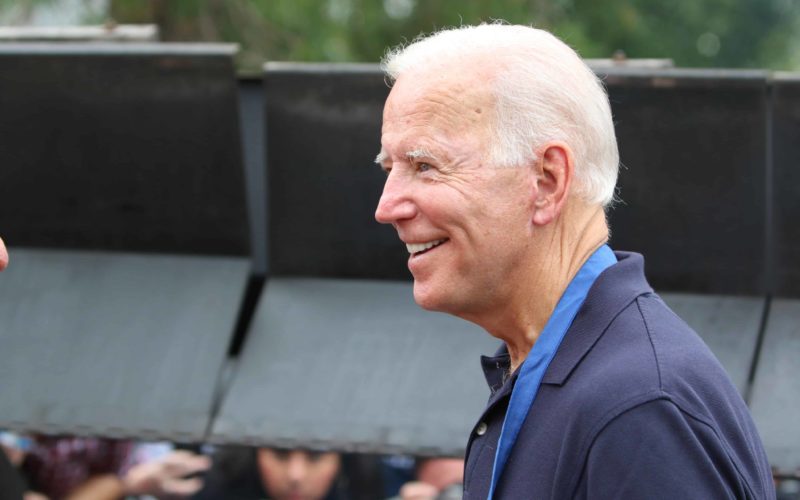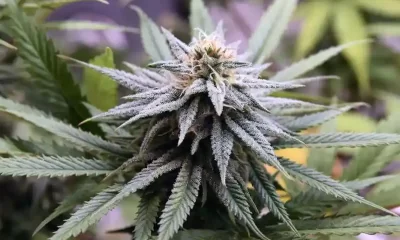Government
Biden Says He’s ‘Working On’ Bill To Release Cannabis Inmates

President Biden, returning to Washington after a trip to the Middle East, told reporters that no one “should be in prison for the use of marijuana.”
President Joe Biden reiterated his belief that no one should be behind bars for using cannabis, saying Sunday that he is working on legislation to help fulfill that campaign promise.
Biden, returning to Washington, D.C. following a four-day trip to Israel and Saudi Arabia, made the comments to a gaggle of reporters gathered on the White House lawn.
One reporter asked the president if he intended to honor his “campaign pledge to release all the marijuana inmates in prison.”
“I don’t think there should — I dont think anyone in pri- — anyone should be in prison for the use of marijuana,” Biden said, according to a White House pool report. “We’re working on the Crime Bill now.”
The brief response represented Biden’s most extensive and explicit comments on cannabis reform since his term began last year.
But it was also something Biden has said previously, most notably on the campaign trail in 2020. While he has yet to embrace outright cannabis legalization, Biden has long spoken out against marijuana-related incarceration.
In a memorable interview on “The Breakfast Club” in the spring of 2020, Biden said that it “makes no sense for people to go to jail” for weed and explained why he supports decriminalization but not legalization.
“Because they’re trying to find out whether or not there is any impact on the use of marijuana, not in leading you to other drugs, but what it affects. Does it affect long term development of the brain and we should wait until the studies are done,” Biden said. “I think science matters.”
Comments like that––as well as Biden’s refusal to support an end to the federal prohibition––have frustrated cannabis reform advocates, as well as members of the president’s own party.
In November, three Democratic senators sent a letter to Biden urging him to “pardon all individuals convicted of nonviolent cannabis offenses, whether formerly or currently incarcerated.”
“Our country’s cannabis policies must be completely overhauled, but you have the power to act now: you can and should issue a blanket pardon for all non-violent federal cannabis offenses, fulfilling your promises to the American people and transforming the lives of tens of thousands of Americans,” the senators, Elizabeth Warren, Ed Markey and Jeff Merkley, wrote in the letter.
“As a candidate for President, you argued that, ‘We should decriminalize marijuana,’ and, ‘Everyone [with a marijuana record] should be let out of jail, their records expunged, be completely zeroed out,’” they wrote. “The first and simplest step in the process is a blanket pardon. The Constitution grants you the authority to pardon broad classes of Americans to correct widespread injustice, as previous presidents have done.”
In May, Biden commuted 75 individuals who were serving time for nonviolent drug offenses and issued three full pardons.
There is robust support for cannabis legalization among Democrats on Capitol Hill, but that has not yet translated to policy reform.
The Democratic-controlled House of Representatives passed the Marijuana Opportunity, Reinvestment, and Expungement (MORE) Act in April, a bill that would remove cannabis from the list of federal Controlled Substances Act.
But the bill has since stalled in the Senate, where Democratic leaders have said they intend to produce their cannabis reform bill.
In April, Chuck Schumer, the Democratic leader in the Senate, said that the caucus would release its marijuana legislation at some point before the Congressional recess in August, pledging that the bill would also remove weed from the Controlled Substances Act.
But there are growing indications that the legislation in the Senate will be far more scaled back than what Schumer had promised.
Politico reported last month that Schumer “doesn’t have the votes to pass a sweeping marijuana decriminalization bill — despite repeatedly touting his support for ending federal prohibition,” and that “realization is leading Senate Democrats to look for a compromise on weed.”
Source: https://hightimes.com/news/biden-says-hes-working-on-bill-to-release-cannabis-inmates/
Business
New Mexico cannabis operator fined, loses license for alleged BioTrack fraud

New Mexico regulators fined a cannabis operator nearly $300,000 and revoked its license after the company allegedly created fake reports in the state’s traceability software.
The New Mexico Cannabis Control Division (CCD) accused marijuana manufacturer and retailer Golden Roots of 11 violations, according to Albuquerque Business First.
Golden Roots operates the The Cannabis Revolution Dispensary.
The majority of the violations are related to the Albuquerque company’s improper use of BioTrack, which has been New Mexico’s track-and-trace vendor since 2015.
The CCD alleges Golden Roots reported marijuana production only two months after it had received its vertically integrated license, according to Albuquerque Business First.
Because cannabis takes longer than two months to be cultivated, the CCD was suspicious of the report.
After inspecting the company’s premises, the CCD alleged Golden Roots reported cultivation, transportation and sales in BioTrack but wasn’t able to provide officers who inspected the site evidence that the operator was cultivating cannabis.
In April, the CCD revoked Golden Roots’ license and issued a $10,000 fine, according to the news outlet.
The company requested a hearing, which the regulator scheduled for Sept. 1.
At the hearing, the CCD testified that the company’s dried-cannabis weights in BioTrack were suspicious because they didn’t seem to accurately reflect how much weight marijuana loses as it dries.
Company employees also poorly accounted for why they were making adjustments in the system of up to 24 pounds of cannabis, making comments such as “bad” or “mistake” in the software, Albuquerque Business First reported.
Golden Roots was fined $298,972.05 – the amount regulators allege the company made selling products that weren’t properly accounted for in BioTrack.
The CCD has been cracking down on cannabis operators accused of selling products procured from out-of-state or not grown legally:
- Regulators alleged in August that Albuquerque dispensary Sawmill Sweet Leaf sold out-of-state products and didn’t have a license for extraction.
- Paradise Exotics Distro lost its license in July after regulators alleged the company sold products made in California.
Golden Roots was the first alleged rulebreaker in New Mexico to be asked to pay a large fine.
Source: https://mjbizdaily.com/new-mexico-cannabis-operator-fined-loses-license-for-alleged-biotrack-fraud/
Business
Marijuana companies suing US attorney general in federal prohibition challenge

Four marijuana companies, including a multistate operator, have filed a lawsuit against U.S. Attorney General Merrick Garland in which they allege the federal MJ prohibition under the Controlled Substances Act is no longer constitutional.
According to the complaint, filed Thursday in U.S. District Court in Massachusetts, retailer Canna Provisions, Treevit delivery service CEO Gyasi Sellers, cultivator Wiseacre Farm and MSO Verano Holdings Corp. are all harmed by “the federal government’s unconstitutional ban on cultivating, manufacturing, distributing, or possessing intrastate marijuana.”
Verano is headquartered in Chicago but has operations in Massachusetts; the other three operators are based in Massachusetts.
The lawsuit seeks a ruling that the “Controlled Substances Act is unconstitutional as applied to the intrastate cultivation, manufacture, possession, and distribution of marijuana pursuant to state law.”
The companies want the case to go before the U.S. Supreme Court.
They hired prominent law firm Boies Schiller Flexner to represent them.
The New York-based firm’s principal is David Boies, whose former clients include Microsoft, former presidential candidate Al Gore and Elizabeth Holmes’ disgraced startup Theranos.
Similar challenges to the federal Controlled Substances Act (CSA) have failed.
One such challenge led to a landmark Supreme Court decision in 2005.
In Gonzalez vs. Raich, the highest court in the United States ruled in a 6-3 decision that the commerce clause of the U.S. Constitution gave Congress the power to outlaw marijuana federally, even though state laws allow the cultivation and sale of cannabis.
In the 18 years since that ruling, 23 states and the District of Columbia have legalized adult-use marijuana and the federal government has allowed a multibillion-dollar cannabis industry to thrive.
Since both Congress and the U.S. Department of Justice, currently headed by Garland, have declined to intervene in state-licensed marijuana markets, the key facts that led to the Supreme Court’s 2005 ruling “no longer apply,” Boies said in a statement Thursday.
“The Supreme Court has since made clear that the federal government lacks the authority to regulate purely intrastate commerce,” Boies said.
“Moreover, the facts on which those precedents are based are no longer true.”
Verano President Darren Weiss said in a statement the company is “prepared to bring this case all the way to the Supreme Court in order to align federal law with how Congress has acted for years.”
While the Biden administration’s push to reschedule marijuana would help solve marijuana operators’ federal tax woes, neither rescheduling nor modest Congressional reforms such as the SAFER Banking Act “solve the fundamental issue,” Weiss added.
“The application of the CSA to lawful state-run cannabis business is an unconstitutional overreach on state sovereignty that has led to decades of harm, failed businesses, lost jobs, and unsafe working conditions.”
Business
Alabama to make another attempt Dec. 1 to award medical cannabis licenses

Alabama regulators are targeting Dec. 1 to award the first batch of medical cannabis business licenses after the agency’s first two attempts were scrapped because of scoring errors and litigation.
The first licenses will be awarded to individual cultivators, delivery providers, processors, dispensaries and state testing labs, according to the Alabama Medical Cannabis Commission (AMCC).
Then, on Dec. 12, the AMCC will award licenses for vertically integrated operations, a designation set primarily for multistate operators.
Licenses are expected to be handed out 28 days after they have been awarded, so MMJ production could begin in early January, according to the Alabama Daily News.
That means MMJ products could be available for patients around early March, an AMCC spokesperson told the media outlet.
Regulators initially awarded 21 business licenses in June, only to void them after applicants alleged inconsistencies with how the applications were scored.
Then, in August, the state awarded 24 different licenses – 19 went to June recipients – only to reverse themselves again and scratch those licenses after spurned applicants filed lawsuits.
A state judge dismissed a lawsuit filed by Chicago-based MSO Verano Holdings Corp., but another lawsuit is pending.
Source: https://mjbizdaily.com/alabama-plans-to-award-medical-cannabis-licenses-dec-1/
-

 Business2 years ago
Business2 years agoPot Odor Does Not Justify Probable Cause for Vehicle Searches, Minnesota Court Affirms
-

 Business2 years ago
Business2 years agoNew Mexico cannabis operator fined, loses license for alleged BioTrack fraud
-

 Business2 years ago
Business2 years agoAlabama to make another attempt Dec. 1 to award medical cannabis licenses
-

 Business2 years ago
Business2 years agoWashington State Pays Out $9.4 Million in Refunds Relating to Drug Convictions
-

 Business2 years ago
Business2 years agoMarijuana companies suing US attorney general in federal prohibition challenge
-

 Business2 years ago
Business2 years agoLegal Marijuana Handed A Nothing Burger From NY State
-

 Business2 years ago
Business2 years agoCan Cannabis Help Seasonal Depression
-

 Blogs2 years ago
Blogs2 years agoCannabis Art Is Flourishing On Etsy













